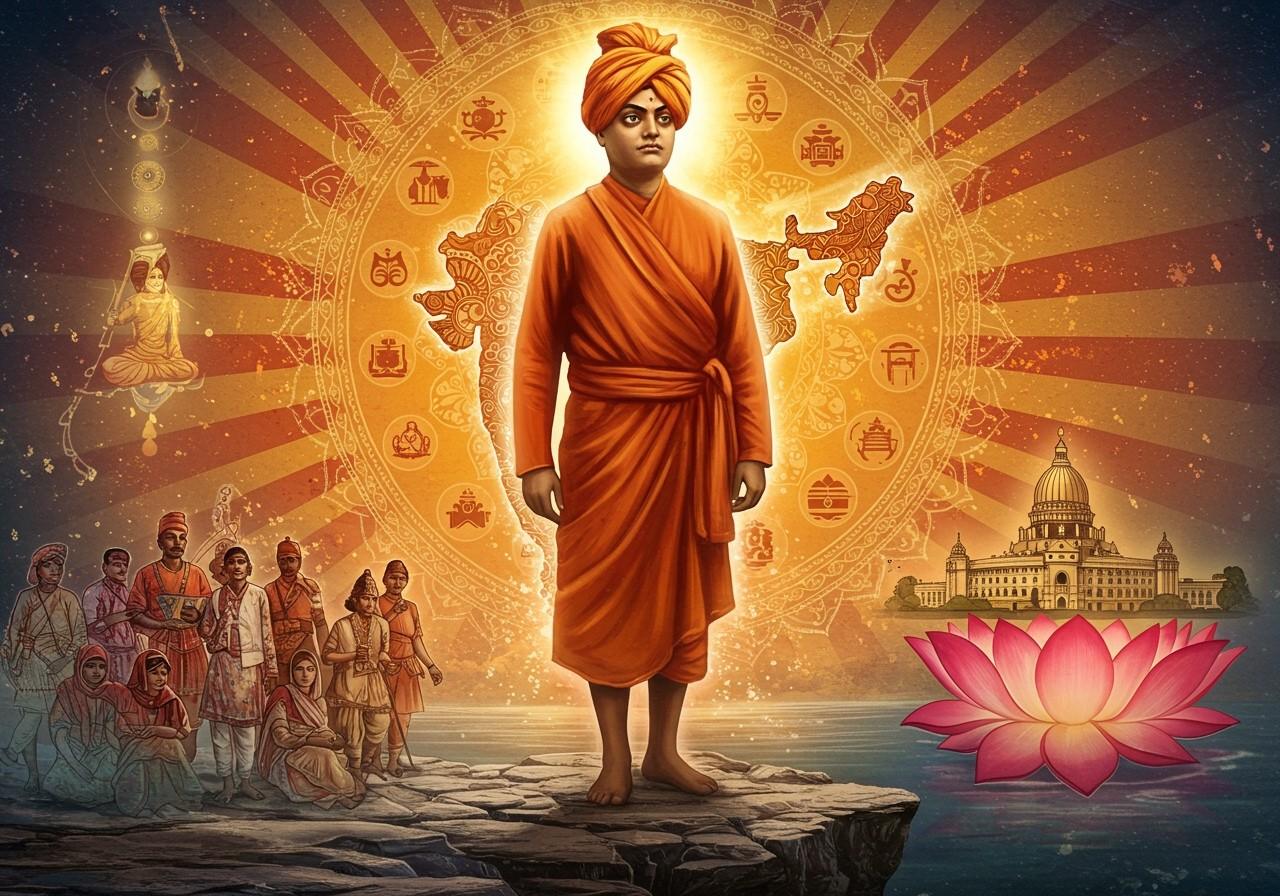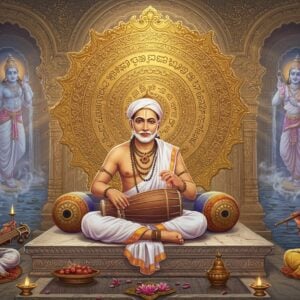
Swami Vivekananda, a name synonymous with spiritual awakening and national pride, played a pivotal role in shaping India’s identity. His teachings, deeply rooted in Vedanta philosophy, transcended mere religious discourse and became a clarion call for national resurgence. During a period marked by colonial rule, his message of self-reliance and strength resonated deeply, sparking a cultural renaissance and igniting the flames of patriotism.
His iconic speech at the 1893 Parliament of the World’s Religions not only introduced India’s spiritual heritage to the world but also instilled a sense of self-worth within Indians themselves. He reminded us of our rich cultural legacy, urging us to embrace our roots and stand tall on the world stage. This was more than just religious revival; it was the foundation of a new national consciousness.
The Essence of Vivekananda’s Nationalism
Swami Vivekananda’s concept of nationalism was unique. It wasn’t merely about political freedom; it was about a deeper, spiritual awakening. He envisioned a nation rooted in its ancient wisdom, yet progressive and self-reliant. Education, in his view, was the key to unlocking this potential, empowering individuals and igniting the national spirit. True nationalism, he believed, meant uplifting the downtrodden and fostering unity among all, regardless of caste or creed.
Critiquing blind imitation of Western ideals, he urged Indians to draw strength from their own cultural heritage. His powerful speeches inspired countless freedom fighters and reformers, laying the groundwork for the struggle for independence. Just as the Ramayana continues to influence Indian culture, so too does Vivekananda’s vision continue to inspire us today.
Vivekananda’s Influence on the Freedom Movement
While not a freedom fighter in the conventional sense, Vivekananda’s influence on the movement was profound. His call for fearless action and unwavering self-confidence resonated deeply with future leaders of the independence struggle. His words became a source of strength and inspiration, fostering a sense of national identity that fueled the fight for freedom. The Ramakrishna Mission, founded in his honor, became a platform for social reform and national awakening, embodying his vision of service and spiritual upliftment. Many freedom fighters credited Vivekananda for igniting their patriotic fervor and commitment to the cause of independence. His emphasis on the core beliefs and practices of Hinduism strengthened the cultural fabric of the nation.
Vivekananda’s Contribution to India’s Resurgence
Swami Vivekananda’s contribution to India’s resurgence was multifaceted. He viewed education as a powerful tool for empowerment and national development, promoting its spread across all sections of society. He revived pride in India’s spiritual heritage, effectively countering the colonial narrative of cultural inferiority. His social reform efforts challenged deep-rooted discriminatory practices like casteism, advocating for equality and social justice. On the global stage, his travels and insightful speeches garnered respect for India, showcasing its rich philosophical traditions and spiritual depth. Much like the Ramayana’s profound influence on Hindu spirituality, Vivekananda’s teachings continue to shape our understanding of our own spiritual heritage. His influence sparked a cultural renaissance, impacting art, literature, and philosophy, and the Ramakrishna Math and Mission continue to carry forward his vision of service and education. His teachings remain a guiding light for leaders and citizens alike in modern India.
Vivekananda’s Enduring Legacy in Modern India
Even today, the legacy of Swami Vivekananda remains vibrant and relevant. His teachings on self-reliance and national pride deeply resonate with India’s aspirations for global leadership. Educational and spiritual institutions across the country continue to disseminate his message, ensuring that his wisdom reaches future generations. His profound impact on India’s soft power is evident in our cultural diplomacy, which often draws upon our rich spiritual heritage. His emphasis on religious harmony holds immense significance in today’s diverse India, promoting peaceful coexistence and mutual respect. Similar to the lessons of loyalty and sacrifice found in the Ramayana, Vivekananda’s teachings on unity and selflessness guide us towards a stronger and more compassionate nation.
Initiatives across the nation continue to honor his legacy, focusing on service, education, and cultural preservation. National Youth Day, celebrated on his birthday, serves as a powerful reminder of his enduring influence on youth empowerment. His vision of a united, spiritually enriched India continues to guide our development, inspiring us to strive for a future where every individual can reach their full potential.
Key Aspects of Vivekananda’s Influence on Indian Nationalism
- Instilling Spiritual Foundations: Swami Vivekananda didn’t just preach spirituality; he intertwined it with the concept of nationhood. He believed that India’s spiritual heritage was not merely a collection of rituals, but the very bedrock of its cultural identity. This foundation, he argued, must be protected and nurtured for the nation to truly flourish. He presented spirituality not as a retreat from the world but as a source of strength and resilience in the face of adversity.
- Promoting Cultural Pride: During a time when colonial rule had undermined Indian self-esteem, Vivekananda reminded Indians of their glorious past. He urged them to take pride in their cultural and religious heritage, fostering a sense of self-assurance and unity. This revival of cultural pride was crucial in countering the prevailing sense of inferiority and fostering a sense of collective identity.
- Emphasizing Self-Reliance and Strength: Vivekananda’s message was not just about embracing the past; it was about building a strong future. He stressed the importance of self-reliance and self-respect for national progress. He urged Indians to be confident in their abilities and take ownership of their destiny, fostering a sense of national identity rooted in self-belief. This emphasis on inner strength was essential in preparing India for the challenges of self-governance.
- Inspiring a Vision of National Regeneration: Vivekananda saw nationalism as a spiritual awakening, a process of national regeneration. He believed that true freedom wasn’t just about political independence but about restoring the dignity, self-respect, and moral strength of the Indian people. His vision inspired countless individuals to work towards a revitalized India, a nation that was not only free but also strong and self-assured. He called for a resurgence of moral values, a rediscovery of inner strength, and a renewed commitment to national progress.
- Universalism and Harmony: While deeply rooted in Indian traditions, Vivekananda’s nationalism was also remarkably inclusive. He promoted universalism, advocating for harmony between diverse communities within India. His vision was of a pluralistic society, characterized by mutual respect and understanding. He emphasized building a national character that valued morality and unity, transcending narrow divisions of caste, creed, and religion.
Embark on a Spiritual Journey with Authentic Puja Items from Poojn.in
Inspired by Swami Vivekananda’s teachings and seeking to deepen your spiritual practice? At Poojn.in, we offer a wide range of authentic puja items to support your journey. Just as Vivekananda emphasized the importance of both inner reflection and outward ritual, we provide you with the tools to enhance both aspects of your spiritual life. Whether you’re looking for spiritual texts like the Bhagavad Gita or seeking the perfect clay diya for Saraswati Puja, we have everything you need. We also offer a variety of premium-quality puja clothes and sacred threads, ensuring that your spiritual practice is conducted with utmost reverence.
Addressing Common Queries about Vivekananda’s Influence
What was Swami Vivekananda’s perspective on nationalism? Vivekananda believed true nationalism was about spiritual unity, transcending the boundaries of caste and religion. He emphasized the importance of a collective national consciousness based on shared values and aspirations.
Did Swami Vivekananda actively participate in India’s freedom struggle? While not directly involved in political movements, Vivekananda’s teachings on self-reliance, unity, and cultural pride deeply influenced the leaders and foot soldiers of the freedom struggle, laying the philosophical groundwork for the movement.
In what ways did Swami Vivekananda’s teachings impact Indian nationalism? His powerful message of self-confidence, spiritual strength, and unity inspired Indians to reclaim their heritage and strive for independence.
What were Swami Vivekananda’s key contributions to India? He elevated India’s spiritual heritage on the global stage, instilled national pride, and inspired countless individuals to pursue self-improvement and work towards a unified nation. His teachings remain relevant even today, guiding our path towards a stronger and more spiritually awakened India.
How did Swami Vivekananda’s teachings shape India’s future? By promoting self-reliance, spiritual strength, and cultural pride, he empowered Indians to embrace their identity and contribute to the building of a united and prosperous nation.
Why is Swami Vivekananda considered a national icon? His pivotal role in reviving Indian spirituality and promoting a unique form of nationalism earned him a revered place in India’s history. His teachings continue to inspire generations, shaping our understanding of nationhood and our aspirations for the future. He remains a symbol of strength, wisdom, and spiritual awakening.
What was Swami Vivekananda’s message to the youth of India? He urged young Indians to believe in themselves, work tirelessly for national progress, and embrace their responsibilities as citizens of a rising nation. His call for self-belief, hard work, and national service continues to resonate with the youth even today. He encouraged them to be agents of change, to build a nation rooted in its spiritual values while embracing progress and modernity. This message of empowerment and responsibility continues to inspire young people across India to strive for excellence and contribute to the nation’s growth.


